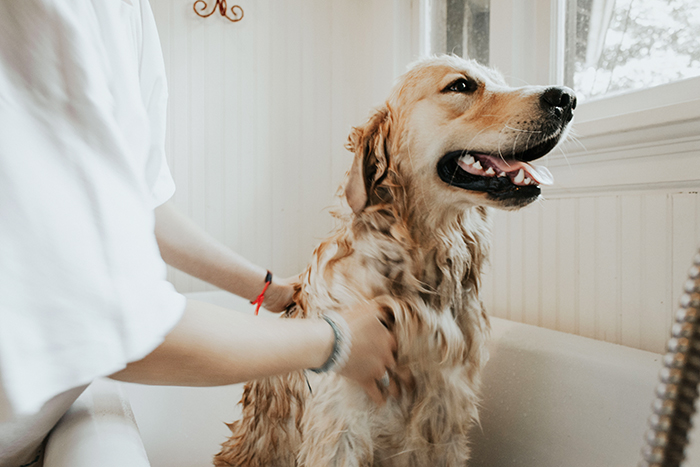
Just as with kids, how we parent our canine companions will determine how they listen, behave, interact with people, grow up and mature. There are many ways to successfully parent our pooches, but a few pitfalls lie in wait as puppies grow up and new dogs enter our lives.
Some of the most common dog parenting mistakes, aka bumps in the road, are listed below. Many of these are offered up by Vets and animal behaviorists who consistently care for dogs and work to curb these negative tendencies. Parenting a dog while trying to avoid these hiccups can be challenging, but the payoff is huge when our dogs grow up to be good canine citizens who are properly trained, socialized and fit.
Whether you are considering becoming a dog parent for the first time, or you are already one of the 43 million U.S. households that own a dog according to the American Veterinary Medical Association, the following common dog parenting mistakes are worth reviewing and avoiding whenever possible. The more in sync your pet is with your expectations, the better the entire experience will be for all involved.
Research and due diligence not adequately performed prior to the selection of a dog. What type of dog fits your personality? Do you want an energetic dog or a couch potato? Are you planning to keep your dog outside or let him enjoy the finer trappings of life such as Elegant Dog Furniture, cozy surroundings and a front row seat in front of your HDTV? In other words, which breed of dog best fits your activity level and lifestyle? How much space do you have for a dog to roam, both inside and out? How much time will you have each day to spend with your pooch and how long will your new canine friend be expected to be on his own? These are some of the questions that need to be researched, asked of shelter personnel, talked about with reputable breeders, and honestly answered by the entire family before choosing a dog.
Purchasing a dog from a newspaper or online ad. However tempting newspaper ads or online postings on sites such as Craigslist may seem, the odds are stacked against you that the situation will end up being a worry-free experience. In fact, it can be quite the opposite. The old adage stating “You get what you pay for” typically rings true in these situations. Another adage says “An ounce of prevention is worth a pound of cure”. Dogs mass produced by puppy mills or casually bred by families aren't professionally managed and can come with unwanted health issues over a dog's lifespan. This can lead to costly vet and medical bills. Although dogs adopted from a breeder are quite a bit more expensive, breeders will "breed out" these negative traits and are typically more than willing to take back a dog anytime if things don't work out. It is a given that you will pay more for a dog through a reputable breeder, but you often get that back by reduced vet and medical bills over time. By consulting with vets, qualified shelter personnel or reputable breeders as to the right breed and dog for you, it will take a lot of the guesswork out of the equation and you and your canine companion will be more compatible in the long run.
Choosing unhealthy breeds. Some breeds carry a lot more risk for medical issues and a shortened lifespan than other breeds. According to the Mother Nature Network, vets sigh when certain dog breeds walk through the door because they know the pet owner can expect a lifetime of health issues. The most prominent example is the bulldog. Other breeds are also prone to various medical issues brought on by heredity or lax breeding standards but typically fare better with proper, ongoing medical care. It’s a good idea to research how healthy and long-lived various breeds are and what ailments they are predisposed to encounter during their lifetime. A strong argument can be made for seeking out responsible breeders whose dogs produce offspring which are more likely to be free of lifetime medical issues.
Waiting too long to socialize your puppy or dog. Puppies and new dogs should be socialized sooner rather than later. The best window of opportunity for puppy socialization is within the first 3 to 4 months. Of course, they should be up to date on their vaccinations, but it’s important to introduce them to other adults, kids and dogs sooner rather than later in life. Puppies enjoy and relish new experiences, so during this time, they are especially open to meeting new people and pets. If a new dog is older, it’s still good to socialize them as soon as possible so you can identify situations where they are comfortable and encounters where they still need work.
No or inconsistent training. Training is important. But consistent training is critical. For training to be effective it needs to be consistent through time. This means that everyone in contact with the dog needs to participate and enforce the training for it to be effective. And the same words or phrases need to be spoken by everyone for it to work. For example, if an outward facing palm is coupled with the command to “stay”, then that hand gesture needs to be used by each person all the time. Not just sometimes. If the palm faces upward and moves toward the sky for the “sit” command, that same hand gesture needs to be used all the time by everyone. Appropriate commands for each dog to learn are; “sit”, “stay”, “down”, and “heel”.
Letting your dog walk you. It may not seem like a big deal, but try to never let your dog walk you. You should always remain in control and never let your dog assert their dominance over you. A properly trained and submissive dog should heal only on your left side with their nose even with or slightly behind your left leg. According to Pet Care RX, tens of thousands of people are injured and end up in the hospital each year as a result of their dog pulling too hard on the leash and sending them flying head over heal.
Not setting house rules or boundaries. A good recipe for a disobedient dog and a strained canine-human relationship is not setting any house rules or boundaries. It also leads to dogs exhibiting dominate behavior. Start as early as the first day the puppy or new dog enters the home. Not eliminating inside is one such boundary that needs to be established early on. If rooms are off limits, then gates need to be installed or that boundary needs to be addressed through training. The same goes for jumping up on people, scratching furniture or walls, roughhousing inside or barking uncontrollably.
Focusing more on punishment than praise. If Fido has an accident and you catch him in the act, then you are right to make him aware that he shouldn’t eliminate inside the house. But, if you don’t catch him red-handed, punishing him won’t do much good. He often won’t be able to tie the punishment back to his eliminating inside - unless it was very recent. The desired approach is to reward positive behavior while reducing opportunities for him to make mistakes in the first place. If you take ownership of the mishap yourself and work to help him not make the same mistake again, while praising good deeds with attention and treats, you will make quicker progress than if you scold.
Leaving kids unsupervised around new dogs. Kids and dogs typically get along great, but when new puppies or dogs are introduced to kids without proper supervision, it can lead to some issues if the kids push the dog to the point where the dog becomes uncomfortable, nervous or scared. There should always be proper supervision as kids and dogs begin interacting for the first few times to make sure that each is comfortable with each other and that the interaction goes well. Get more tips on Introducing Kids to Dog in our previous post.
Leaving dogs alone too long. Socialization is a big deal for dogs. After all, they are pack animals and are used to being around other dogs or humans on a regular basis. Leaving dogs alone for more than six or seven hours on a regular basis can lead to undesirable behavior such as not eating, being destructive, becoming withdrawn or a host of other issues that can present themselves in a negative way. If someone can check on them or let them out for a little while to break up the boredom, it can help a lot.
Allowing your pooch to become overweight. This is a situation that can be easily corrected with more exercise, the proper amount of food at mealtimes and the elimination of extra treats. Overweight dogs carry a lot of excess fat that essentially destroys their body from within. Don’t join the crowd of dog owners who feed their pets too much because they “love” their furry friends. Show even more love by keeping pets at a healthy weight.
Failing to take care of your dog’s teeth and/or nails. Proper oral hygiene is as critical for dogs as it is for humans. Healthy teeth lead to a healthier overall dog. Brushing your dog’s teeth on a regular basis and providing dental friendly bones for chewing will go a long way toward maintaining their overall health. The same goes for keeping their nails trimmed or walking them enough to naturally keep their nails worn down.
Skipping your dog’s annual checkup. Annual checkups are an important tool for getting ahead of anything that could arise health-wise, whether for humans or dogs. It provides a good baseline from year to year as to the overall health of your pet. It can be tempting to skip this annual ritual, but your pet will be better off in the long run if you are able to catch something early versus later.
Forgetting to give heartworm and flea preventatives. It’s critical not to forget about these important parasitic preventatives. Put a note or sticker on your calendar each time you give them preventative medicine. This way you will be reminded to give it to them again the next month at the same time. The pain and suffering a dog can go through if they are unfortunate and get heartworm is not something a dog owner wants to witness. And if fleas take over a pet, everyone in the house suffers and remediation efforts are a must. There are great medicines available to keep dogs from getting heartworm or fleas. It just has to be administered.
Man’s best friend has lived with us for tens of thousands of years. With the right dog parenting approach, while trying to avoid many of the common mistakes we dog parents tend to make in raising our canine companions, the relationship between man and canine that has formed over the millennia will continue getting stronger and stronger as time marches on.
04.24.2019
Kids love dogs. And dogs love kids. History abounds with tales of children and dogs being the best of friends.Some examples include Snoopy, Old Yeller, Lassie, Benji, Petey, Toto, Clifford, and their kid companions. >>> READ MORE
25 Spring Cleaning & Organizational Tips for Pet Parents
02.28.2019
Spring has almost sprung! It is officially only a few weeks away, and in some parts of the country tree buds are beginning to show blossoms or leafing out, and the grass is starting to green up. >>> READ MORE
Please complete this form and click "Submit". Our Customer Support team will gladly address your request and respond in a timely manner.
Richell USA, Inc.
Copyright © Richell, Inc.. All rights reserved